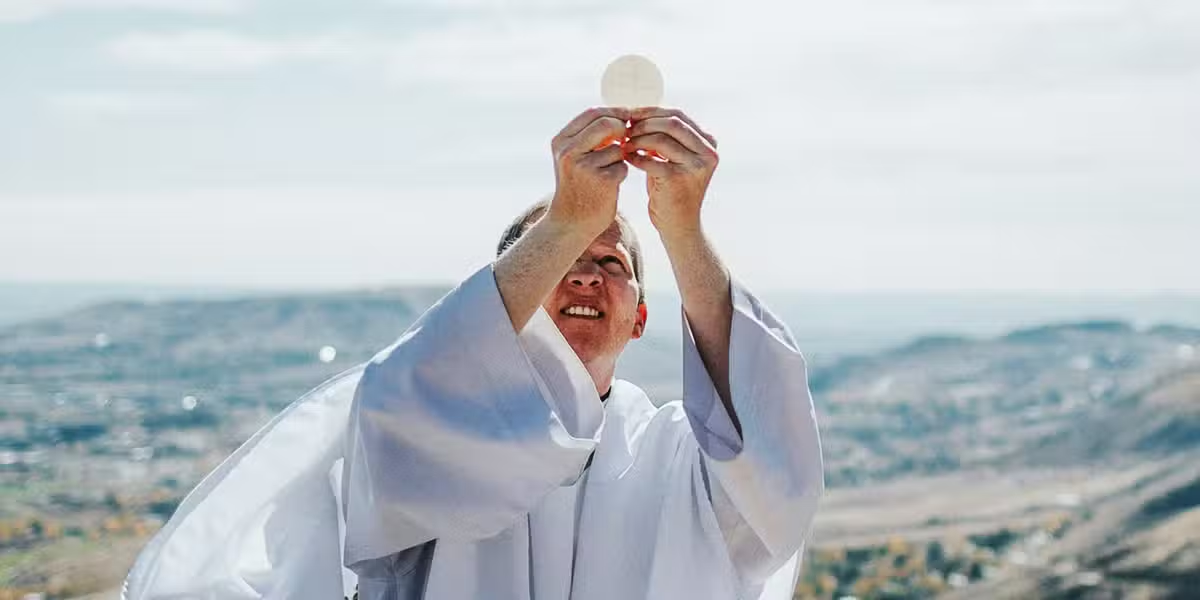Adult children taking on the care of a parent with dementia embody Christ’s love.
In the Catholic faith we have an endless source of renewal available to us through the Mass, the sacraments, Scripture, and the saints. In my own life, I’ve observed that key words come to me when I need strength or wisdom.
In the last few years, the words of St. Teresa of Avila have emerged front and center as I navigate my mother’s dementia diagnosis. This beloved passage deeply resonates when caring for a loved one with dementia and Alzheimer’s: “Christ has no body but yours; yours are the hands with which he blesses the world.”
The Centers for Disease Control estimates that over 5.8 million people in the United States have been diagnosed with dementia, and because it is a disease that frequently results in the loss of autonomy, there are, alongside all these patients, millions and millions of caregivers. As I’ve crossed paths with dozens of family members in this role, St. Teresa’s words have become increasingly clear. I’ve been left in awe by the stories I’ve witnessed and heard.
I became curious about all these caring hands of Christ, and whether the caregivers saw within themselves the spirituality that I perceive in them. While there are countless sons, husbands, and wives also involved in this unwavering work, I will share here the stories of three daughters I had the privilege of interviewing.
‘I Didn’t Sign Up for This’
I met Brenda, the older sister of a friend, at a local coffee shop and was transfixed by her beauty: long blond hair, high cheekbones, glamorously dressed in black leather and faux fur.
One thing I’ve learned from interviewing people about what’s in their hearts is that heartaches quickly spill out. Within minutes, tears sprang to her eyes. Her mother, a demanding and belittling person, leaves both her daughters exhausted. Their situation might be more arduous than most: Their mother has always had a cold personality, ever since they were children. Yet the women are committed to ensuring that the end of their 85-year-old mother’s life will be as safe and comfortable as possible.
“I draw from the human,” Brenda told me. “She’s a human. But it’s difficult. I’m always doing things, and it’s never good enough. I do everything for her. Taxes, medicines, insurance, appointments. ‘Bring me coffee next time,’ my mother says. ‘Plain coffee?’ ‘Yeah, plain coffee.’ I bring it to her. ‘There’s no flavor to this.’”
Brenda shrugged. “I get no reward.”
I let that sink in. While I had only just met Brenda, my admiration swiftly ran deep: Wow, here is a woman of integrity.
We paused for a moment, sipping our cooling lattes. I put my cup down, picked up my notebook and pen. “Do you ever call out to God?”
She laughed. “Yeah, alone in my car. I thought I would live a fun, easy life at this age, here in my fifties. I thought I could go and do things without worry. Be free. And I say, ‘I didn’t sign up for this.’”
We both cracked up over the absurd, common truth of yelling at God in our cars about our burdens. Isn’t this the most aching situation of all? No matter the details, we will navigate something painful we did not sign up for.

I was eager to switch to the topic I specifically came to ask her about. “St. Teresa of Avila says, ‘Christ has no hands on earth but ours’. It’s us. And our hands. And I see this in women like you. What do you think?”
She thought for a minute, then nodded. “That would make sense.”
“So what hands does he have? The daughters like you bringing the bags and bags of Walmart Christmas gifts. You are doing the work of Christ.”
Though she could recognize it in the work of others, there was resistance in applying this idea to herself. She stiffened, her tone crisp. “That’s a little extreme.”
“But is it? If you look through the lens of that saying, who the heck is taking care of your mom?”
She got a faraway look on her face then, a bit dreamy. “Right. Yeah.”
“Your hands,” I stress.
“My hands,” she softly agrees.
Brenda unspools a story of how heart-wrenching her life has been with her mother, ever since she was a little girl. “My mom put me in therapy when I was 10 to deal with my volatile behavior after she divorced my dad. The therapist must have figured out that my mom wasn’t able to give me the love I needed. She told me I’d have to find my mothering elsewhere. I was so desperate. That therapist used to let me drink Earl Grey tea. I had never had it, and I loved how it made me feel so wonderful. Drinking it was so warming and gave me a boost of energy. Just a little milk or cream. She had these mugs, and such a soft voice.”
I felt goosebumps, hearing of the hands that reached toward Brenda, back when she was alone and vulnerable, offering her wisdom and guidance and Earl Grey tea.
“What a miracle,” I shook my head. “People are put in our path for a reason. That therapist gave you sustenance. You made it to adulthood, and now here you are, all these years later, such a good person, simply trying to bring your elderly, confused mother the coffee she wants.”
‘Help Me Make This Better’
I’d known Jenette through a mutual friend, but we’d never interacted in depth. Due to icy weather, we ended up connecting for an interview over Zoom.
She appeared on my screen with a warm smile, tortoiseshell glasses, and, behind her, a photograph of baby lambs in mist. Very quickly, I learned that she not only does everything for her mother in assisted living, she has the added responsibility of caring for a sister who is physically and intellectually disabled. Her sister is also housed in assisted living, but at a location half an hour in the opposite direction from their mother.
Ever since she was a child, Jenette understood she would, at some point in her life, have to protect and care for her sister. It was staggering to learn about how Jenette structures her days to tend to her family’s never-ending needs, yet she is an upbeat, strong woman full of gratitude.
When I asked if she was brought up in a faith, she reflected that she was raised to be kind, and to help people, and recounted the adage that hung on the refrigerator in her childhood home: “God will never give me more than I can handle, but I wish he didn’t trust me so much.”
I thought of the weight on Brenda’s shoulders, how she, too, strove to be strong. But since it’s inevitable that even the hardiest among us must break open sometimes, I told Jenette about what Brenda confided. “I interviewed another daughter like you who admitted that sometimes she just shouts, ‘I didn’t sign up for this.’ And actually, there’s profanity in there.”
Jenette laughed. “That has come out of my mouth so many times! I’ve used that exact phrase!”
I wanted to offer her the support she deserved. “You give so much! Do you pray?”
“I do. When things get difficult, that’s when I hit my knees. Sometimes when it’s really bad I am in a fetal position on the floor. It’s like, let me just be here for a while.”
Is there anything more moving than when someone—a stranger, especially—shares their most wounded moments? I felt incredible respect, picturing a woman in her 60s, overcome with her obligations in using her hands in the world, weeping, curled up as tight as a baby.
“What happens to get you to that point?” I asked.
She didn’t hesitate. “Loss. Loss of the confidence to be able to keep doing what I need to do. Please help me make this better. A feeling of being put upon. I just wish I didn’t have the responsibility. But . . . I have two magnificent friends who are also taking care of their mothers. We meet for coffee or tea. We meet in a parking lot with our chairs and talk. We just need a break. How could anybody do this without some kind of support? We all feel grateful for the lives we have. We are healthy, have a nice place to live. We have each other. We live in a nice country. We all say to each other, ‘I’m so blessed to have you as friends.’”
In hearing that Jenette had friends being there for her, I saw once again that there is a flow to the hands of Christ. One pair keeps giving to the next.
I put forth my St. Teresa quote. “So, what do you think? Where is Jesus except in us?”
In the same way Brenda seemed comforted by these words, Jenette repeated, “In us.”
“I guess what I am saying,” I offered as we began to close, “is that I believe in Christ’s beauty. I feel that St. Teresa is expressing, ‘We’re doing beautiful work.’ That we are embodying something really precious.”
‘He Just Wants Me to Be With Him’
Lisa is both my friend and my hairdresser, a warmhearted, welcoming person. Over the years, we have talked about the challenges of our aging parents. I knew about her mother’s decline, including a partial leg amputation, and then the sorrow of losing her mom and having to put her dad in assisted living. It was a particular story of Lisa’s that first illuminated the truth of the St. Teresa quote for me.
As she trimmed my hair one day, Lisa told me about a recent visit to her dad. Every Sunday, he delights in the Whoopie Pies she brings him. “He always asks about his car. Well, the car is long gone, and he doesn’t remember. He worries obsessively about the car’s battery dying. So sometimes I leave his room for a few moments, and when I return, I assure him—and I do have to lie—that the battery is fine. That the car turned over. And he’s relieved.
“But then,” she continued, recounting the recent visit, “as the afternoon drew to a close, and I was packing up to leave, I turned around and I saw my dad talking to someone who wasn’t there. And it broke my heart. He was so animated, and certain the person was on his bed. I knew it was time to go. Sometimes it’s just so hard to see him like that.”

I was moved by imagining this scene, the sorrow of this daughter, trying her best to be there with love. I asked if she would consider reflecting with me on the topic of spirituality in dementia and Alzheimer’s. Her answer moved me.
“It’s in his innocence. My dad asks, ‘Where’s my watch?’ He looks down and lifts his sleeve. ‘Oh, there it is.’ And he’s cute. They all love him. The workers love to say hi to my dad. He says of the women, ‘They’re my groupies.’ And they crack up. Nothing bothers him. He always has a little smile. When I think of him, I think, I want to come visit you. He just wants me to be with him. To be present. We watch TV together, and when I look over, he’s fallen asleep. But he’s happy I’m there.”
I shake my head in admiration. “It’s such unsung, unseen work.”
Lisa agreed. “When I was moving my parents, the assisted living director called and said, ‘Your dad’s going to need a garbage pail, a shower curtain, a laundry basket.’ I was working all day and called my friend in sheer panic. I said, ‘Do you have any time today to go to Walmart?’ She said ‘Yeah, what do you need?’ I come home from work that day and all the stuff is sitting on my porch. My friend said, ‘I got it. I got this.’ It restores your faith in people,” Lisa said.
It absolutely does. I know these stories will continue, in my own role as a daughter and in the lives of all the caregivers. While the challenges of caring for those with dementia and Alzheimer’s will remain daunting, and painful, it’s also an opportunity to see the Teresa of Avila quote in action. The endless love and tender caring. The comfort of knowing that Christ can be found in all the hands that give to us, and in our hands as we give to those still fiercely cherished and loved.









1 thought on “In the Hands of Christ ”
So wonderful! People being there for their parents, even when they maybe weren’t the best or kindest to them. It was so heartwarming for me to hear that sometimes people end up being kind and sweet with their dementia or Alzheimer’s. It is a heart wrenching illness for the loved one’s and they truly do have the compassion of Christ!